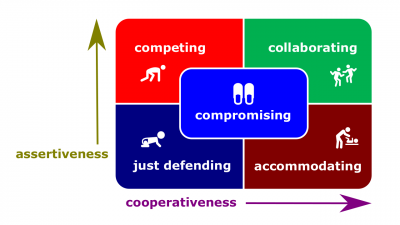Difference between revisions of "Compromising intent"
(→Related coursework) |
|||
| (2 intermediate revisions by one other user not shown) | |||
| Line 1: | Line 1: | ||
| − | [[Compromising]] is a situation in which each party to a conflict is willing to give up something. | + | [[File:Conflict-intentions.png|400px|thumb|right|[[Conflict intention]]s]][[Compromising intent]] (or, simply, [[compromising]]) is a situation in which each party to a conflict is willing to give up something in order to gain something. |
| Line 5: | Line 5: | ||
According to [[Organizational Behavior by Robbins and Judge (17th edition)]], | According to [[Organizational Behavior by Robbins and Judge (17th edition)]], | ||
::[[Compromising]]. A situation in which each party to a conflict is willing to give up something. | ::[[Compromising]]. A situation in which each party to a conflict is willing to give up something. | ||
| + | According to [[Looking Out, Looking In by Adler, Proctor (15th edition)]], | ||
| + | :[[Compromising]]. An approach to conflict resolution in which both parties attain at least part of what they wanted through self-sacrifice. | ||
==Related concepts== | ==Related concepts== | ||
| Line 12: | Line 14: | ||
*[[Social Rationale Quarter]]. | *[[Social Rationale Quarter]]. | ||
| − | [[Category: Septem Artes Administrativi]][[Category: Articles]] | + | [[Category: Septem Artes Administrativi]][[Category: Articles]][[Category: Human Communications]] |
Latest revision as of 15:11, 9 July 2020
Compromising intent (or, simply, compromising) is a situation in which each party to a conflict is willing to give up something in order to gain something.
Definitions
According to Organizational Behavior by Robbins and Judge (17th edition),
- Compromising. A situation in which each party to a conflict is willing to give up something.
According to Looking Out, Looking In by Adler, Proctor (15th edition),
- Compromising. An approach to conflict resolution in which both parties attain at least part of what they wanted through self-sacrifice.
